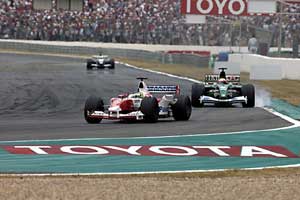SEPTEMBER 15, 2003
Thoughts on the Formula 1 calendar

On Thursday last week the FIA issued the first official Formula 1 World Championship calendar for 2004. There was not much discussion on the subject because, as Ron Dennis pointed out, "expressing an opinion is normally only worthwhile if it has some influence on something and as the calendar is not decided by the teams and as we aren't asked to put forward an opinion there's pretty much no point in putting forward one now". On the face of it there will be 17 races next year but it is important to notice that four of the races are provisional. Bahrain and China should not have a problem because it is simply a question of the tracks being inspected for safety. The Belgian Grand Prix is subject to tobacco legislation being formalized. The French Grand Prix is the interesting one. At a recent meeting of the team principals they were asked by Bernie Ecclestone which races they did not like. Brazil came out with the lowest rating but it is essential for the sport to be in Latin America and so allowances must be made. When asked about Europe, the F1 team bosses gave the French Grand Prix the thumbs down. It seems that the organizer is now helping to hurry the demise of the event as Formula One Management is rumored to be owed something around $10m from this year's event. If that is not paid the race is dead and the calendar will be down to 16 events with a three-week break between the United States GP at Indianapolis on June 20 and the British GP on July 4. The other interesting thing about the calendar is the timing of some of the races. Coming up with a calendar is a difficult business but often in the past the least favoured races end up with controversial dates. This would seem to be true in 2004 for the European GP at the Nurburgring. A race on April 25 in the Eifel Mountains is not going to be a very attractive event for spectators. At that time of year the region can be cold, wet and foggy. In fact back in 1985 a Formula 3000 race, scheduled on April 28, was cancelled because the track was buried under snow. The San Marino GP also has a date change and one cannot help but wonder whether this has been done to fill the gap that might otherwise be open for Canada. If Montreal can sort out the tobacco issues it would fit very nicely into the June 6 slot. Imola has rather more fundamental problems which need to be addressed. In order to do the work needed to stay in the World Championship, the locals need to move the river that runs behind the F1 paddock. This is technically possible but it would be very expensive to do and Imola does not seem to have the money available. For the moment, therefore, one must assume that the San Marino GP event is "baby-sitting" the date for someone else in 2005. Putting Canada back on the schedule might be possible in 2005 if other non-tobacco races join the World Championship, because the contracts between teams and tobacco companies which stipulate how many non-branded races will be allowed do not necessarily say which races these must be. With branding allowed in China, Belgium, Bahrain and Turkey having a non-branded race in Canada may be possible. The British Grand Prix on July 4 is not the race's traditional weekend and one might interpret this as an attack on Silverstone because July 4 is the date of the final of the men's competition at Wimbledon and the final of the Euro 2004 Football Championship in Portugal. This means that Silverstone is unlikely to pull in a big crowd and TV viewing figures will be down. The reason for the switch from July 11 would seem to be because that weekend is the British round of the MotoGP World Motorcycling Championship at Donington Park and because France wanted to steer clear of July 4 because in addition to Wimbledon and the Euro 2004 soccer, it is also the first day of the Tour de France bicycle race. The other big change is that Brazil goes to the end of the year. The weather will be much the same as it is in the Spring and the date change makes a lot of sense because the World Championship showdown will now be on a time zone which will allow it to be broadcast on prime time TV in Europe, still F1's biggest TV markets. It will also be at a sensible time for the Americas. The downside is that Sao Paulo is not popular and so perhaps it is worth keeping an eye open for plans to switch the race to a different venue in Brazil. Interlagos is a great racing circuit but Sao Paulo does not fit the bill at all in terms of the kind of image F1 likes to promote. Rio de Janeiro has always been better and this was the reason why the race switched from Interlagos to Rio back in 1979. It was also when Nelson Piquet was rising to prominence in F1 circles. A few years back Piquet and Emerson Fittipaldi tried to raise the money to take F1 back to Rio but they failed to find the investment they needed. Now it might be a different matter. Piquet's son Nelson Jr. is now a leading contender in the British Formula 3 Championship and will probably end up in F1...